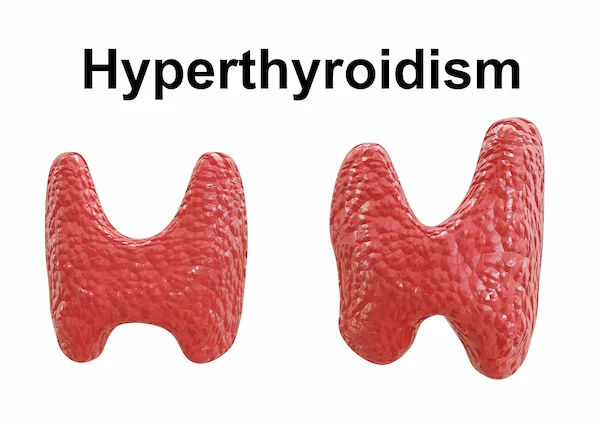Thyroid Stimulating Hormone (TSH): Understanding its Implications
TSH regulates thyroid hormone production, impacting metabolism and overall health. This guide explores its role, causes of high levels, symptoms, diagnostic tests, treatment options, and preventive measures for thyroid disorders.

Written by Dr Sonia Bhatt
Last updated on 3rd Jul, 2025
Secreted by the pituitary gland, the thyroid-stimulating hormone controls the production of thyroid hormones thyroxine (T4) and triiodothyronine (T3) and serves as an intermediary for the thyroid gland. A feedback loop ensures the TSH level is readjusted based on circulating levels to ensure homeostasis.
The regulatory axis, known as the hypothalamic-pituitary-thyroid (HPT) axis, involves the hypothalamus, pituitary gland, and thyroid. The hypothalamus produces thyrotropin-releasing hormone (TRH), which prompts the pituitary gland to release thyroid-stimulating hormone (TSH). Elevated levels of triiodothyronine (T3) and thyroxine (T4) prevent the secretion of TSH.
This article provides in-depth research on the role of the thyroid-stimulating hormone on thyroid hormone synthesis.
Causes of High Thyroid Stimulating Hormone
Understanding the causes of high thyroid-stimulating hormone may help the affected person control the hormone levels and prevent themselves from any other health complications. Some of the common causes are:
Hypothyroidism
- Primary Hypothyroidism: The most common cause of a high TSH level is when the thyroid gland cannot produce enough T3 and T4, and the pituitary gland is required to boost the production of TSH. Hashimoto’s thyroiditis (an autoimmune condition that attacks the thyroid gland) is a common cause leading to primary hypothyroidism.
- Congenital Hypothyroidism: In these cases, the thyroid gland is underdeveloped at the time of birth.
Secondary Causes
- Pituitary Adenomas: These are non-cancerous growths in the pituitary gland which secrete more TSH than usual.
- Resistance to Thyroid Hormone: This is a rare genetic defect where tissues become incapable of responding to T3 and T4.
Effects of Drugs and Other Factors
- Medications: These include lithium, amiodarone, and anti-thyroid drugs.
- Illnesses: Severe infections or chronic kidney disease can lead to a high TSH level.
- Pregnancy: During this time, there may be temporary spikes in TSH due to fluctuations in hormonal levels.
Symptoms of High TSH
When the TSH level is high, it can cause a wide range of symptoms that affect both physical and mental health. These include:
Physiological Symptoms
High TSH usually manifests with hypothyroidism symptoms, which may include:
- Fatigue and weakness
- Unexplained weight gain
- Cold intolerance
- Dry skin and hair loss
- Constipation
- Myxedema, which manifests with a puffy face and swelling
Psychological and Emotional Symptoms
High TSH levels can impact mental health by causing:
- Depression
- Memory challenges
- Difficulty in concentrating (brain fog)
- Irritability or mood swings
Diagnosis of High TSH Levels
High TSH levels can be identified through various diagnostic tests, including:
- Blood Tests: These tests provide the level of concentration within the blood. In clinical settings, the normal TSH hormone ranges usually fall between 0.4 and 4.5 mIU/L, and values can vary depending on the laboratory used.
Free T4 and T3 Tests: These tests assess the amount of circulating thyroid hormones. - Thyroid Antibody Tests: These tests are used for autoimmune disorders like Hashimoto's thyroiditis.
- Ultrasound Imaging: It helps determine the size and composition of the thyroid gland.
Get Your Thyroid Levels Assessed
Treatment Techniques for High TSH Levels
The first treatment for high TSH levels due to hypothyroidism is synthetic T4, levothyroxine. This therapy brings hormones back into balance and alleviates the symptoms of high TSH levels. The dosages are tailored for every person according to the TSH level, age, and medical history of the affected person.
In addition to pharmacologic interventions, lifestyle and dietary modifications can help prevent hypothyroidism and control its symptoms. A balanced diet with sufficient amounts of iodine, seafood, iodised salt, selenium, nuts, and whole grains may benefit people with high TSH levels.
Chronic stress is known to interfere with the HPT axis. To help avoid such situations, it is important to keep a check on stress levels and remain mindful and aware of any changes or other symptoms related to high TSH levels in the body. Physical activity can also be an efficient way to increase energy levels and metabolism.
Complications of Untreated High TSH Levels
Untreated high TSH levels can lead to a range of serious complications. Here are some of the potential risk factors:
Metabolic Effects
If untreated for long, elevated TSH levels may cause significant metabolic disorders, such as:
- Extreme fatigue and weight gain
- Dyslipidemia (elevated cholesterol levels)
- High risk of obesity
Cardiovascular Complications
High TSH levels are associated with cardiovascular complications, such as:
- Hypertension
- Bradycardia (slow heart rate)
- High risk of atherosclerosis and heart failure
Follow-up and Monitoring of High TSH Levels
Follow-up monitoring is always necessary to validate that treatment is working for the affected person. Periodic TSH testing of the patient ensures that the amount of drugs administered can balance the hormonal levels in the body.
It is necessary for the patient to periodically have their treatment plan revised based on the following:
- Changes in weight or diet
- Pregnancy
- Onset of new symptoms
- Prevention of thyroid dysfunction
Preventive Measures for Thyroid Health
A balanced approach that includes proper nutrition and regular exercise is vital for the long-term management of thyroid health.
Nutritional Guidance for Thyroid Support
Iodine is key for hormone production, found in seafood, dairy, and iodised salt. Selenium, which supports thyroid enzymes, is in nuts, fish, and eggs. Zinc, important for thyroid hormone metabolism, is in meat, shellfish, and legumes. These nutrients help keep the thyroid functioning well.
Role of Regular Exercise
Working out regularly enhances general endocrine wellness, including hormone levels. It also reduces thyroid inflammation. Yoga and meditation can reduce the stresses associated with thyroid diseases.
Conclusion
High TSH often represents underlying hypothyroidism or other thyroid disorders. Knowing the causes, symptoms, and treatment available helps in effective management. Early detection and treatment prevent complications and can improve quality of life.
Consult Top Endocrinologist
Get Your Thyroid Levels Assessed
₹536(₹1341)60% off
₹2364(₹5910)60% off
₹2472(₹6179)60% off
₹1505(₹3763)60% off
₹2999(₹7498)60% off
Consult Top Endocrinologist

Dr. B Rachana
General Physician/ Internal Medicine Specialist
8 Years • MBBS, Fellowship in Diabetes, Fellowship in Applied Nutrition,CCEBDM(Diabetes)
Bengaluru
Apollo Clinic, JP nagar, Bengaluru
Dr. Mohammad Sharfraz Ahamed
Endocrinologist
6 Years • MD GENERAL MEDICINE(KURNOOL MEDICAL COLLEGE), DM Endocrinology(SKIMS, Deemed university)
Nellore
Apollo Speciality Hospitals, Nellore

Dr. Tripti Sharma
Endocrinologist
7 Years • DM Endocrinology MD Medicine
Hyderabad
Apollo Hospitals D R D O kanchanbagh, Hyderabad
(75+ Patients)

Dr. Ramya Varada
Endocrinologist
6 Years • MD, DM
Chinagadila
Apollo Hospitals Health City Unit, Chinagadila
(125+ Patients)

Dr. Sridevi Paladugu
Endocrinologist
15 Years • MD, DM
Hyderabad
Apollo Hospitals Jubilee Hills, Hyderabad
(225+ Patients)



